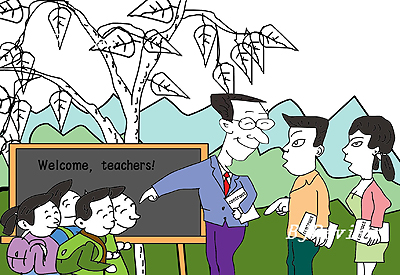
Cash-strapped students desperate to get top quality education now have an opportunity to realize their dream. But there's a catch. Through a new initiative, students can opt for free education at prestigious learning institutions in exchange for a commitment to work in education for 10 years. While the initiative has alarmed some, students from poor backgrounds could well see this as a way out, despite what those against the policy call harsh, almost exile like, conditions.
Policymakers of China's Ministry of Education said that it would carry out a free schooling program in six normal universities for training of teachers starting from this autumn semester. Students, who applied for this teacher training program, will be totally exempt from every expense at universities, including both tuition and boarding fees. In fact eligible students will even receive a living allowance from the state.
However, the authorities require that every student who enjoys free education must agree to engage in teaching in his/her home province for a minimum of 10 years after graduation. If they fail to fulfill the contract, they should pay back the schooling costs, in addition to default penalties. For those students signed up with schools in urban areas, they have to first work at rural schools for at least two years. Students cannot be full-time postgraduates within the validity period of the contract.
An estimated 12,000 students will be included in this free teacher training program, among which the vast majority come from less developed central and western provinces. Currently, the average cost of putting one student through university is 10,000 yuan a year, far beyond the means of some extremely poor rural families.
On the other hand, despite a remarkable improvement of income and social status in metropolitan areas, teachers in rural China are still plagued by poverty and disrespect.
In a move designed to boost education resources in rural areas, where elementary schools are poorly staffed, policymakers are encouraging top students to choose teaching as a career by offering them a free ride.
The requirement of these students to teach at rural schools has, as expected, ignited an inferno of nationwide debate. People argue that it is discrimination expecting poor students to spend 10 years of their youth in remote rural areas.
It is predicted that, apart from those who voluntarily choose to help with rural education, most of the students will be unable to withstand the lonely life of their enforced solitude. This could result in these teachers wanting to reverse their initial decisions and seeking to find a way out, unless their salaries and welfare benefits were dramatically improved.
Teachers want respect, not a free lunch
Bi Ke (www.cri.cn): The new policy will be challenged as a result of its restraints on students, who are confined to a certain occupation by being deprived of the right to choose. It is ridiculous to have such restrictions in a society where the values of liberty and freedom are so dominant.
Given the state of underdevelopment in rural China, all university students of higher education are motivated to make contributions to their country through initiatives like compulsory education. However, a fair, just and open social environment also requires protection of lawful and reasonable rights of every citizen. The free teacher-training system should not be confined to
| 